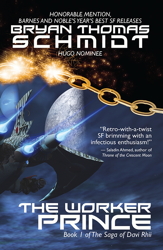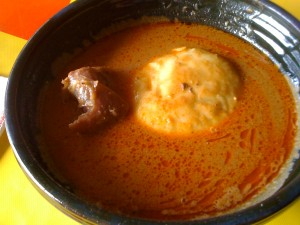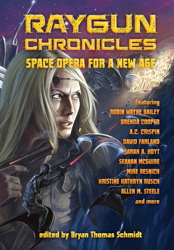
On any given week, my introductions here at EATING AUTHORS can be more or less coherent. This week’s entry, I fear, is likely to lean toward the lower end of the scale. The explanation for this has something to do with my typing these words while I sit at a desk in a hotel in Boston in the middle of the Arisia convention, as well as the fact that the formal release event for Barsk happens in Philadelphia less than 48 hours after I return home, and that I’m on a plane bound for Detroit and ConFusion about 8 hours after that, where in addition to another four day convention I’m also doing two off-site signings. Or to put it more simply: “Wheeeeee!”
Fortunately, this week’s guest, Bryan Thomas Schmidt has a long history in this wacky business and will understand and (probably) not hold any of this against me. I first met Bryan some year’s back during a Worldcon when he crashed the annual breakfast that I organize for members of the Codex online writing community. I couldn’t blame him for showing up; Bryan is well known as an editor of anthologies, and there assembled in one crowded restaurant were some fifty authors, many of whom had doubtless sold him stories in the past (and plenty more eager to join those ranks). But his editorial skills aside, last autumn saw the release of his novel The Worker Prince from the fine folk at WordFire Press. Let’s hope it’s just the first of many more to come.

LMS: Welcome, Bryan, and my apologies for not getting you here sooner. But now that you are here, please tell me about your most memorable meal.
BTS: Back in 2001, I was in Ghana on a small mission team, there to teach various aspects of music and worship leading—all practical stuff. We were not evangelizing. We were there by request to help them build their skill set and knowledge in the arts. As part of the process, we spent a great deal of time studying local culture and history so as to be able to help them grow but not superimpose Westernism on them. That is always a challenge and so when we were invited as guests to one of our host’s homes, we gladly accepted it as both a kind offer and a chance to learn from the inside about African cultural life.
Our host, Charity, promised to make us a national dish known as fufu, and we figured this would be a really authentic experience.
Now, fufu is one of those really African meals. It is something that takes on many forms in various cultures and countries there, and so ingredients may vary, but the Ghanaian version is made with cassava flour and either groundnut or goat soup. It consists of a dough-like ball of the cassava—which looks very much like playdoh when served—dipped in soup. And the idea is to eat it with your fingers, breaking off pieces and dipping them in the soup then eating them.
I am not much for finger food. Not a big fan of buffalo wings or anything that gets my fingers sticky or dirty to start with. So this was a very foreign concept to me. They had given us silverware, as I recall, but when I tried to use the spoon to break off pieces of the fufu, they laughed and instructed me to use my hands: “like this.†So, not wanting to cause offense, I did.
To me, it was like eating playdoh dipped in goat soap. The chunks of goat meat were really much more enjoyable to me. But I was in Africa with some very kind, generous people, being well received and learning a ton as well as teaching skills they obviously needed and wanted, so I was all about honoring them for honoring me as best I could in any circumstances. That was my mindset. So I ate the fufu and pretended to enjoy it. The soup wasn’t bad, as I said, but the fufu itself was not going to go on my greatest meals list.
We finished dinner and discussed various aspects of culture, life, music, etc. then as we prepared to leave, I made a huge mistake. As we thanked them profusely for their hospitality and letting us into their home—something many Ghanaians do not do to just anyone. Home is private and only shared with close friends or loved ones—they asked us how we’d enjoyed the meal. I, being a good sport I thought, said, “Best fufu I ever had. I really liked it. Thank you for introducing it to us.†They graciously accepted, of course, looking pleased, and we left.
It wasn’t until a few nights later I realized my mistake. I was being introduced during our workshop’s closing ceremonies to a crowd of several thousand. And the host announced that I had taken and come to love the national meal, fufu. I, of course, smiled and nodded, playing along. No need for saying anything that might cause offense. Who cares right?
For the next several years, every time I was invited to a home, people wanted me to have fufu. They wanted me to come to their houses specifically for a meal. So I found myself stuck making excuses about not having time to visit everyone, wanting to try different things, etc. And I went back again twice more to Ghana on such workshop trips. I’m sure if I went back again, someone would still think I love fufu and offer it to me.
Who knew the kindness and generosity could backfire? Not me. So that was a memorable meal that haunted me after. Still, no real regrets. I still have such fond memories of African culture and the Ghanaian people and treasure all I learned there and all the people and places I saw along the way. But I did not ever ask for the recipe for fufu. It’s readily available online though.

Thanks, Bryan. There’s an almost Dickensian quality to this tale, and I find myself thinking of the ghost of fufu past. Or maybe not.
Next Monday: Another author and another meal!
#SFWApro
Tags: Eating Authors



